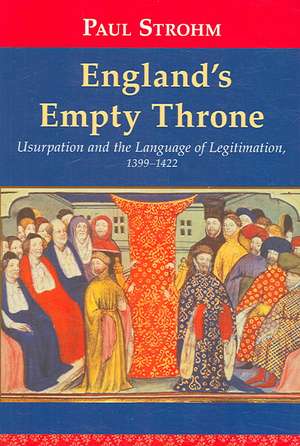England`s Empty Throne – Usurpation and the Language of Legitimation, 1399–1422
Autor Paul Strohmen Limba Engleză Paperback – 29 iun 2006
Preț: 279.23 lei
Nou
Puncte Express: 419
Preț estimativ în valută:
53.44€ • 55.72$ • 44.41£
53.44€ • 55.72$ • 44.41£
Carte tipărită la comandă
Livrare economică 21 martie-04 aprilie
Preluare comenzi: 021 569.72.76
Specificații
ISBN-13: 9780268041212
ISBN-10: 0268041210
Pagini: 294
Dimensiuni: 152 x 228 x 20 mm
Greutate: 0.49 kg
Ediția:1
Editura: MR – University of Notre Dame Press
ISBN-10: 0268041210
Pagini: 294
Dimensiuni: 152 x 228 x 20 mm
Greutate: 0.49 kg
Ediția:1
Editura: MR – University of Notre Dame Press
Recenzii
"Paul Strohm's strikingly original . . . book offers rich opportunities for thinking about the relationships between textual analysis and historical understanding. . . . [His] analysis of Lancastrian texts and imagination will undoubtedly prove immensely energizing in medieval English literary and cultural studies. If its full implications for medieval history are also recognized and explored, its impact will be even more profound and enduring." —Review of English Studies
"[Henry IV's] usurpation stands exposed as a scandalous rupture in the line of succession. Strohm's powerfully argued book deals with the usurper's efforts to mend the rift with lies and propaganda, and explores the unpredictable and often fantastical forms in which the Lancastrian repressed staged its return." —Times Literary Supplement
"England's Empty Throne . . . confirms Paul Strohm's extraordinary ability to disclose and interpret elements of social and political contestation in texts produced in late medieval England, even (or especially) when such disclosure seems farthest from the overt intent of their composers or sponsors." —Arthuriana
Notă biografică
Paul Strohm is Anna S. Garbedian Emeritus Professor of Humanities at Columbia University.
Descriere
After the dethronement and subsequent murder of Richard II, the usurping Lancastrian dynasty faced an exceptional challenge. Interrupting a long period of Plantagenet rule, Henry IV and Henry V needed not only to establish physical possession of the English throne but to occupy it symbolically as well. In this boldly revisionary book, Paul Strohm provides a new account of the Lancastrian revolution and its aftermath.
Integrating techniques of literary and historical analysis, he reveals the Lancastrian monarchs as masters of outward display, persuasively "performing" their kingship through a variety of novel ceremonies in a quest for legitimacy. He also describes far-reaching Lancastrian experiments in domination, including the proscription of prophecy; the enlistment of poetry as court propaganda; the extensive use of spies and informers; and, most ambitiously, the redefinition of treason to cover not only overt deeds but words and thoughts as well.
Strohm's account of the Lancastrian quest for legitimacy, and the uses of symbolic power, illuminates—indeed, recasts—our understanding of a period of unprecedented political upheaval.
Strohm's account of the Lancastrian quest for legitimacy, and the uses of symbolic power, illuminates—indeed, recasts—our understanding of a period of unprecedented political upheaval.
